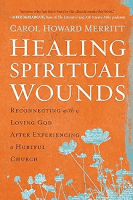Chapter 17.
Healing from Toxic Theology
In this chapter, I discuss the impact of fear-based messages that occur in many Christian churches. The sections are as follows:
The Roots of Toxicity
The toxicity that has frequently characterized Western Christianity is rooted in the notions of a paternal god who punishes or rewards his worshippers. Churches which teach this concept may use fear, guilt and shame as their fundamental force of social control.
God as a Father Figure
Like Judaism and Islam, Christianity is an Abrahamic monotheistic religion whose followers believe in the patriarch Abraham, a prophet in the Hebrew Bible, who worshipped a masculine God. Thus, in Christianity God is typically referred to as a male personage who is addressed as “Father.” This humanlike (anthropomorphic) image of God as a parental figure is very compatible with Christian beliefs in which God is depicted as loving and responsive to the personal needs of believers. In difficult times, Christian believers may seek closeness to “God the Father” as a personal source of strength and safety. However, when God is seen as a personal companion and protector, trust can be shaken when a loss occurs.
God as the Source of Punishment or Reward
The ancient Israelites gave religious meaning to their misfortunes and successes. In the Abrahamic tradition, suffering is often viewed as either a punishment for sin or something caused by an unknown force beyond our ability to understand. Conversely, they believed that God would reward them if they were good.

Christianity inherited these perspectives from the Hebrew Bible (the Old Testament), whose patriarchal ideas greatly influenced and shaped the New Testament. Therefore, Christians often believe in a patriarchal God who makes rigorous demands of them.
Generally, a child born into a Christian family acquires a perception of God that is rooted in the beliefs and values of family and community. Many a Christian child is raised in a safe environment with loving images of God, and God becomes a friend who knows the child intimately. Sadly, however, some Christian children grow up in an environment where they are taught to fear God’s wrath. This God-as-a-wrathful-father image can be particularly harmful to Christians who have lacked a supportive human father.
The Propagation of Shame
Shame is about feeling bad about your entire being, about who you think you are. It is the most harmful and often unbearable emotion. Shame is problematic on all levels. Shame is neither a good deterrent as a teaching device nor a good deterrent against bad behavior. Shame is hurtful and unloving, and the price paid by a person who has been shamed is a loss of self-esteem. Shame keeps people in a state of negativity. A person who has been shamed feels bad, and remains vulnerable to manipulation.
Brené Brown, Ph.D., the author of five number-one New York Times bestsellers and a pioneer in the study of shame and vulnerability, explains, “Shame is highly correlated with addiction, depression, eating disorders, suicide, violence, and bullying.”

Shame is a core teaching of the Bible. The website knowing-jesus.com lists biblical verses that contain the word “shame.” ”Shame” is cited 454 times in the Hebrew Bible (Old Testament) and 77 times in the New Testament, for a total of 531 times. Drawing in part upon Abrahamic influence, Christianity can instill shame through doctrines of sin, guilt and unworthiness.
But this is not how life works. It has been proven over and over that those who we consider to be bad are not necessarily punished, and those we consider to be good are not necessarily rewarded. As Terri Daniel, Doctor of Ministry and interfaith chaplain, points out in her book Grief and God: When Religion Does More Harm Than Healing, “We see no evidence of the punishment/reward model in real life. That’s why the only way the emerging church could control human behavior with the threat of divine punishment was to locate it in the afterlife, where it could not be proven or disproven.” [italics added for emphasis]
Dave Blundell, a Christian pastor and founder of Hungry For Life International, who has authored two books, including Professionally Religious: The Spiritual Poverty of Spiritual Leaders, has said the following about shame and Christianity:
What kicks me in the gut, as a Christian Leader, is the role that religion plays in shaming people. The very force that should give life, often kills someone’s soul. …Religion has this nasty habit of focusing on behaviour over relationship. It has the propensity to try and change someone’s behaviour with shame. … I can understand shame coming from the world, but I can’t fathom it coming from those who claim to follow Jesus.
Shame only suppresses people. In truth, people are uplifted and healed by only one thing, and that is love, which is the heart of Jesus’ teaching.
Toxic Theology
Christian denominations that focus on sin and damnation can cause guilt and shame in members who fail to live up to the image of a God who demands perfect obedience in upholding a strict church doctrine. A child born into one of these denominations is immersed in a fearful view of God. Many who are raised in such denominations grow up with the “fear of God.” Often, there is a sense that God is constantly watching and judging them rather than loving and supporting them.

Health care practitioners who specialize in psychological well-being, including Christian pastors and chaplains, have identified harmful effects caused by specific religious dogma. These harmful effects have become known as toxic theology. Toxic theology is defined in a number of ways, for instance, as:
- Any system that limits spiritual experience to merely accepting beliefs and doctrines (as defined by Dr. David G. Brenner, psychologist, wisdom teacher, and author of more than thirty books).
- Any system in which legitimate human experiences and responses are shamed by religious institutions and systems (as defined by Dr. William S. Morrow, Ph.D., in Toxic Religion and the Daughters of Job).
- Any system that undermines emotional/mental health and includes forms of emotional, mental or spiritual violence (as defined by theologian and psychologist, Dr. Daniel Schipani, Ph.D., author of The Way of Wisdom in Pastoral Counseling).
Dr. Terri Daniel in her book Grief and God: When Religion Does More Harm Than Healing, has compiled the following list of toxic theology traits:
- Followers are held to a rigid, unyielding system of beliefs.
- Questioning and exploration are discouraged.
- Outsiders are viewed with suspicion and disdain.
- Religious pluralism is unacceptable.
- Biblical texts are interpreted literally.
- God is seen as an authoritarian parental figure, who rewards piety and faithfulness, punishes behaviors/beliefs not in line with strict doctrines, and curses people by creating natural disasters, epidemics, and community tragedies.
Effects of Toxic Theology – Real Life Examples
Drawing on her work as an interfaith chaplain, Terri Daniel presents some examples of people that have been harmed by toxic theology:
- One mother believed that her nine-year-old child died from leukemia because God was punishing her for having an abortion 20 years earlier.
- A mother who’d lost all four of her children in separate unrelated incidents said, “I thought nothing like this would happen to me if I was a good person and pleased God.”
- A young wife whose husband was killed by a drunk driver struggled to suppress her anger because she believed that anger comes from Satan and must be resisted.
- A mother whose son died from suicide was plagued by fear that her son would spend eternity in hell.
- Religious friends and family members at the bedside of a dying loved one feared that the person would go to hell if not “saved” before death.

As a case in point, consider Carol Howard Merritt, who was raised as a conservative Baptist and became a Presbyterian minister. She discovered that the religious institutions she grew up in often caused great pain and suffering while purporting to preach about the God of love and grace. She shares her observations in Healing Spiritual Wounds: Reconnecting with a Loving God After Experiencing a Hurtful Church:
…when people celebrate a vengeful God who becomes personally violated with every wrong a person commits and gleefully punishes them, people can feel shameful and long for penance. They are never quite convinced that God will forgive them… Opportunities to let God down abound, especially if we imagine God constantly looking over our shoulder with contempt and outrage, waiting for our next blunder. In reaction to the fear that we disappoint God, we might long for punishment to relieve our guilt, and so we interpret everything as punitive…and then we assume God is teaching us a lesson… And then every uncomfortable thing that befalls us happens because we deserve it.
Religious Trauma Syndrome
In her book The Exvangelicals: Loving, Living, and Leaving the White Evangelical Church, Sarah McCammon describes growing up in a deeply evangelical family and eventually leaving her faith. Her book’s title is a term that some former evangelicals call themselves. She brings her experience as a journalist to interview some leaders in the field of religious trauma syndrome. For two of them, Marlene Winell and Laura Anderson, I encapsulate their insights, exemplified by a few of their quotations excerpted from Sara McCammon’s book.
Marlene Winell, Ph.D., is a former evangelical and pioneer in the treatment of religious trauma. She is the founder and director of Journey Free, an organization that serves people who have left harmful religious groups. Dr. Winell is the author of Leaving the Fold: A Guide for Former Fundamentalists and Others Leaving Their Religion. According to Winell, unlike traumas related to war, car accidents or ongoing sexual abuse, religious trauma can be difficult to pinpoint “because it’s institutionalized . . . as if it’s a good thing. So, environmentally, it’s completely different from other traumas.” Winell explains further that, “With religious trauma, it’s like a different ballgame. There is so much that is mental and emotional.” Thus, when there is a priority given to teachings about hell and a person’s inborn “sin nature,” as in evangelicalism and other fundamentalist sects, the underlying message to children is they are not okay and are not safe. Winell continues, explaining that these messages are reinforced by countless symbols, objects, rituals, and respected leaders.
Dr. Laura Anderson is a Tennessee-based psychotherapist. She cofounded the Religious Trauma Institute in 2019 after noticing similar patterns in her clients, most of whom came from evangelical backgrounds. She became aware of the classic signs of trauma: anxiety and depression, pain and intestinal symptoms, feelings of shame, and a tendency toward social isolation. She recognized that “What was happening in their bodies was consistent with all of my other trauma clients. It is how our body and nervous system experiences those teachings and experiences.”
The non-profit Global Center for Religious Research (GCRR), a non-religiously affiliated academic society and publisher published the results in 2023 of its pioneering work, “Percentage of U.S. Adults Suffering from Religious Trauma: A Sociological Study.” This study was co-authored by GCRR President Darren M. Slade, who earned his doctorate in theology and church history. Dr. Slade sheds light on the pervasiveness of religious trauma in a 2023 interview—Sins and Salvation: The Emotional Toll of Religious Trauma | Dr. Darren Slade (1:26:35). He states that as many as 1-in-3 U.S. adults have suffered from religious trauma at some point in their life, and as many as 1-in-5 currently suffer from multiple debilitating symptoms of religious trauma on a daily basis.
Note: Some survivors of trauma in Christian churches have joined Recovering from Religion or, for Catholics, Survivors Network of those Abused by Priests (SNAP) or Heal Our Church.
The Evolution of Faith away from Toxic Doctrines
Today, many former and current Christians have moved away from the inculcation of shame. In The Future of Faith, Harvey Cox, BD, Ph.D., retired professor from Harvard Divinity School and author of many popular theological books, identified three overlapping periods in the evolution of Christian thinking:
- The earliest period was “the age of faith,” which focused simply on Jesus’ message and following the work he began. There was no centralized dogma.
This is a pre-dogmatic age that began with Jesus and his original followers (early 1st century). This age had dissipated by the time of Emperor Constantine (early 4th century CE) and ended when the Catholic church became the state religion of the Roman Empire (380 CE).
- The second period is the “the age of belief,” which emphasizes belief in doctrines and creeds rather than faith in Jesus and his message. This age places greater emphasis on the New Testament’s stories about Jesus, than on his actual messages.
This period emerged during the formation of the early church when belief in doctrines and catechisms became the foundation for being a Christian. It officially took hold when Constantine made Christianity the official religion of the Roman Empire.
The age of belief is still in full force in many Christian denominations today. Though white Christian religious groups tend to describe themselves as faith based, according to Cox’s analysis, most of them are actually belief based. White Evangelicals are a modern exemplar of the age of belief.
- The third period is “the age of spirit,” which is characterized by the direct experience of the spirit connecting us to God, rather than belief in doctrines and creeds. This age expresses an experiential resonance with the spiritual realm rather than parroting church doctrine.
According to Cox, in the age of spirit, “People are drawn more to the experiential than to the doctrinal elements of religion.” This age, which began to emerge in the mid-20th century, has been expanding in its influence. In 2010, in The Future of Faith, Cox wrote that we are transitioning from “the age of belief” and entering “the age of spirit.” Clearly, America is increasingly experiencing the age of spirit. The trend that Cox foresaw has become more evident. Based on the PRRI 2020 Census of American Religion survey, this trend is apparent in the 7.3% increase between 2006 and 2020 in those unaffiliated with any religion (“Nones”) in the U.S. population. Moreover, among the Nones, 55% believe in some non-Judeo-Christian spiritual force or higher power.

Note: Unfortunately, at the same time that many Americans are entering the age of spirit, a vocal minority is heading in the opposite direction, toward a belief in Christian Nationalism. For more information, see The History and Threat of Christian Nationalism chapter.
The Age of Spirit: Challenges for Rejecting Toxic Doctrines
Openness to the age of spirit may blossom in early adolescence, when children start to explore the social world outside of their families. As they mature, their perspectives can broaden to reflect their personal experiences of Divinity and their exposure to new information. The result may include their moving away from a belief-based church towards a direct, non-anthropomorphic experience of the spirit connecting them to God. One way or another, the age of spirit attracts many people who have eschewed formal religions but continue to identify as spiritual, including Christians who are striving to grow beyond strict beliefs into a more direct experience of spirit within the context of their churches.
We believe that the age of spirit offers Christians an open invitation to abandon toxic theology and align themselves with the spirit of Jesus of Nazareth—a revolutionary who confronted the Judean religious establishment. Today, many Christians are following Jesus’ example and abandoning Christian congregations that promulgate toxic theology. However, this can be challenging. According to Terri Daniel:
The ambiguity of a spiritual rather than a religious outlook can be uncomfortable for those steeped in creed-bound or bible-based religious views. Spirituality (vs. religiosity) can be perceived as dissent, and dissent has traditionally been discouraged by the church. But consider the fact that Jesus himself was a dissenter. Even though he followed the customs of his Jewish heritage, his perspective (as we understand it) was not perfectly aligned with the beliefs of the followers of Yahweh.

William Morrow recognizes that eliminating the anthropomorphic view of God and understanding that the universe does not have humanity at its center can be therapeutic and healing. Liberation from God as a judgmental father figure can relieve suffering by sparing us from every bad experience as something for which we can be blamed. Understanding toxic theology and its effects allows us to begin healing from those effects.

